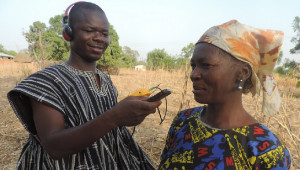Learning positive agricultural techniques and health practices can reduce poverty, malnutrition, and diseases in developing countries. For millions of rural people, low literacy and remoteness are barriers to information access. Extension services are limited because of poorly maintained roads. When materials are available, people can’t read. Local dialects are another barrier.
Literacy Bridge Ghana uses a low-cost, battery-operated audio computer, called the Talking Book, to bring life-changing knowledge to marginalized smallholder farmers and communities. Literacy Bridge Ghana provides an engaging, culturally relevant audio content that helps people learn and adopt new knowledge, beliefs, and practices to improve their agriculture productivity, nutrition, and health. The Talking Book device lets people select and play messages on demand. It has a built-in speaker so families and groups can listen together, and a microphone to let users record their feedback. Because technology collects usage statistics and user feedback, we can monitor programs, identify barriers to behavior change, and use data to update and improve content and programming for better outcomes.
How Talking Book messages are created
Our goal is to provide timely, relevant, accurate content on health, agriculture, child protection, financial literacy, and other topics. We work with local and international NGOs and government experts to plan content that addresses the needs of rural communities. We work with musicians, theater groups, and others to record songs, dramas, expert interviews, and peer endorsements – similar to community radio.
How the Talking Book makes a difference
We use Talking Books for hard to reach communities and demographics – including women and girls. We distribute Talking Books through a household rotation or group listening model. Community agents use the device as an extension tool. In 2019, our UNICEF C4D program will expand to 10 community health centers in Jirapa, Tolon, and Karaga, so we’ll train community health nurses to use Talking Books.
When we launched the first Talking Book programs in Jirapa, we found that farmers who listened to Talking Books increased their crop production by almost 50 percent. Many Talking Book users continue to win the National Farmer Awards.
A UNICEF study showed that families who listened to Talking Books were 50 percent more likely to wash their hands with soap and use bed nets.
Because people can play and repeat the message on demand, in their local dialect, the Talking Book makes a huge difference for learning, retention, and behavior change. Communities also use the Talking Book to record their own songs for topics like hygiene or child marriage.
Our partners
We work closely with Amplio Network, the US-based NGO that provides the Talking Book technology. Over the past decade we’ve implemented programs in the three northern regions of Ghana in partnership with CARE International, UNICEF Ghana, and MEDA, to provide Talking Book programs related to Maternal and Child Health, WASH, Agriculture Extension, Village Saving and Loans, Gender Empowerment, Education, Child Protection, and Climate Change.
To learn more about Talking Book programs, contact [email protected] or visit www.amplio-network.org.

